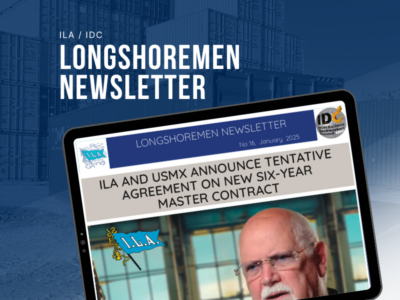NORTH BERGEN, NJ (November 13, 2024)
Brothers and Sisters,
The ILA and USMX came to the table this week, prepared for four days of intensive bargaining to bring us closer to securing a fair contract. For the first day and a half, discussions were productive, and both sides engaged in addressing serious issues. However, late yesterday, talks broke down when management introduced their intent to implement semi-automation—a direct contradiction to their opening statement where they assured us that neither full nor semi-automation would be on the table. They claimed their focus was on modernization, not automation.
The ILA has always supported modernization when it leads to increased volumes and efficiency. For over 13 years, our position has been clear: we embrace technologies that improve safety and efficiency, but only when a human being remains at the helm. Automation, whether full or semi, replaces jobs and erodes the historical work functions we’ve fought hard to protect.
Studies within our industry confirm what we’ve long known—no machine or algorithm can outperform the productivity of a skilled human workforce. Despite this, employers and certain media outlets perpetuate the false narrative that the ILA is stonewalling technological progress. This couldn’t be further from the truth.
Look at our achievements: in one of the major terminals in the Port of New Jersey, we’ve increased daily gate moves to nearly 10,000—a dramatic improvement from the 1,500 moves that once marked a busy day. What’s more, the ILA is processing these 10,000 moves in approximately the same amount of time it used to take for 1,500. This leap in productivity is not just limited to the gates. Our advanced ship-to-shore cranes enable our crane operators to handle containers far more efficiently than they could a decade ago. Additionally, terminal yard container-handling equipment has seen significant advancements, allowing us to maintain some of the most state-of-the-art and efficient terminals in the world. Contrast this with automated terminals worldwide, which consistently lag behind in productivity. Automation is not the panacea it’s often portrayed to be.
It’s disheartening that after making strides in our talks, management resorted to tactics designed to mislead and divide. They’ll likely claim they’re offering to meet our manning proposals as a compromise, but we see through this ploy. Their endgame is clear: establish semi-automation now and pave the way for full automation later. We’ve seen this bait-and-switch strategy in other parts of the world and in other industries, and we will not let it happen on the East and Gulf Coasts.
Now more than ever, solidarity and unity are crucial. Some may question our decision to halt the strike after securing a 62% wage increase over six years. Let’s be clear: strikes are a tool of last resort. They are a hardship for our members and their families, but when backed into a corner, we will not hesitate to wield that weapon. This strike demonstrated our resolve, and while wages were a major hurdle, we believed—and still believe—that further progress could be made at the bargaining table while our members continue their hard work.
We remain committed to securing a fair, equitable contract that ensures long-term stability for our ports and our nation’s economy. Our employers must understand that we are united, shoulder to shoulder, in this fight for the betterment of our hardworking members and their families.
We live in an era where every word and agreement must be meticulously crafted. Trust was a theme management introduced at the outset, promising partnership and collaboration. Yet, once again, their actions speak louder than their hollow words. Automation by any other name is still automation, and the ILA will not be fooled.
Stay strong, united, and resolute. Together, we will show the world that the ILA stands as one, ready to fight for a better way of life for every member and every family who depends on this great union.







Leave a Reply